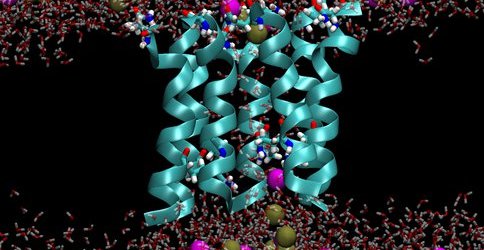Written byAaron Gronstal

May 23, 2018
Research Highlight
Fatty Acid/Phospholipid Blended Membranes

A molecular dynamics simulations of a transmembrane ion channel. Pohorille et al. 2010Image credit: Pohorille et al. 2010.
Researchers studying the evolution of primitive cell membranes have made progress in understanding the potential transition from fatty acid to phospholipid membranes in model protocells. The results support the idea that membranes composed of amphiphilic mixtures, and that do not require membrane transport proteins, could have been an important step in development of primitive cells on Earth.
Cell membranes today contain membrane proteins, which perform a number of essential functions for cell survival. This includes aiding the transport of molecules across the cell membrane. Before these membrane proteins evolved, early cells on earth would have needed to permeable to molecules required for cellular function; yet, they would also have to be stable enough to encapsulate cell components and the biological reactions required for life. Membranes with these traits that are composed of either purely of fatty acids or phospholopids have been difficult to achieve in model protocells.
In the study, researchers examined a ‘blended membrane system’ that contained both oleic acid and a monoacyl fatty acid. This hybrid system had high stability, but was permeable to small, charged molecules like nucleotides. Features of the system facilitate key reactions that are expected to have occurred during the transition from primitive to modern cells.
The study, “Fatty Acid/Phospholipid Blended Membranes: A Potential Intermediate State in Protocellular Evolution ,” was published in the journal Small. The work was supported by NASA Astrobiology through the Exobiology Program.